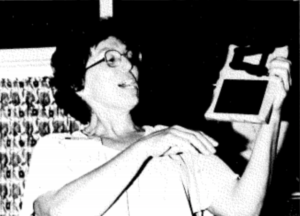In keeping with the October Wastewater Professional theme of “Women in Water,” the CWEA History Committee has produced a brief profile of a woman who was a pioneer in the history of CWEA’s governance.
Historically, the wastewater collection and treatment field in California was dominated by men through most of the 20th century. And, according to Bureau of Labor Statistics, the water and wastewater fields continue to be male-dominated industries on a national basis with women accounting for 4.5 percent of the total number of people employed in water and wastewater operations (2014 data).
The California wastewater field as a male-dominated occupation in the 20th century is directly reflected in the membership of the CWEA Board of Directors and committees during the first 50 years of our Association’s life. The membership of the CWEA Board of Directors remained exclusively male until 1979, when Marilyn Gleaves was elected, becoming the first woman to serve on the Board.
Marilyn Gleaves led what was described as an “incredible life” filled with a series of “firsts.” She was characterized as being a “determined and independent woman” and her determination is reflected in her personal life as well as her career.
Marilyn was born in Ceres California in January 1930 and graduated from Ceres High School in 1947. After high school Marilyn played on a women’s hardball baseball team during the summers and competed in games throughout the Sacramento and San Joaquin Valleys. In an interview with the Modesto Bee, Marilyn recalled that “I knocked the ball all over the place.” “And we beat ’em all. We beat every team we played.”
Marilyn married in 1949, had four children and coached youth baseball before giving birth to triplets on May 13, 1956. Marilyn and her husband divorced after the triplets were born, and she raised her children herself. Marilyn worked in the Modesto area canneries and food processors to support her family. While working, she returned to school, earning an associate degree in biological science from Modesto Junior College. Her work as a laboratory technician for a local poultry processor led to Marilyn being hired by the City of Modesto in 1969.
Marilyn was a pioneer for women in the workplace – she was the first female employee to work at the City of Modesto’s wastewater treatment plant, the City’s first female laboratory technician (1969-1974), the City’s first female industrial waste inspector (1974-1981), the City’s first water systems inspector (1981-1984), and source control inspector (1984-1989). She was also certified as a Grade III Wastewater Treatment Plant Operator during her tenure at the City of Modesto.
Marilyn was very active in the CWEA’s Northern San Joaquin Section (NSJ Section) while working for the City of Modesto. She served in all the NSJ Section’s positions (except for Secretary-Treasurer) and chaired numerous section training sessions and events. Marilyn became the Chair of the Northern Regional Committee which led to her election to the CWEA Board of Directors in 1979.
 In 1982 Marilyn was inducted into the CWEA Select Society of Sanitary Sludge Shovelers, making her the second woman to receive the honor from our Association.
In 1982 Marilyn was inducted into the CWEA Select Society of Sanitary Sludge Shovelers, making her the second woman to receive the honor from our Association.
Marilyn had purchased property near Grayson California just before she was elected to the CWEA Board of Directors and she was in the middle was building her new home on the land while serving on the Board. As described in the CWPCA Bulletin, Marilyn was fully responsible for the construction of her home, contracting the work and doing some of the construction herself.
As described by her family, Marilyn led an amazing life and her drive and determination were reflected in both her career achievements and her personal life.